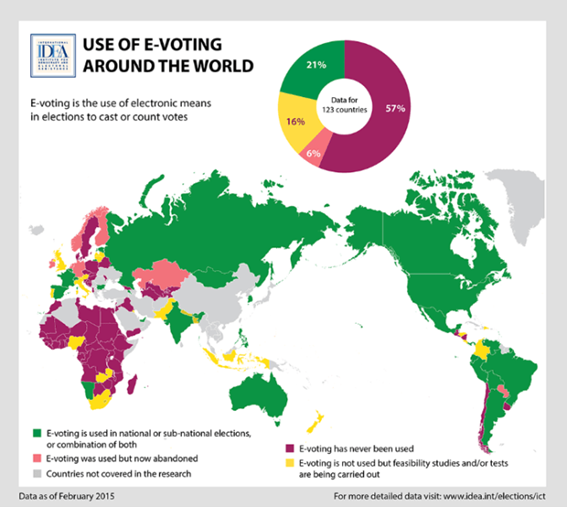Research institutes and conflicts of interest
-min.jpg)
After the first round of elections in Brazil on October 2, 2022, which elected some governors, senators, federal and state deputies, the research institutes are the big stars among the fierce dispute over the presidency of the Republic. Research institutes managed to get the attention of society, which was, until then, debating whether the electronic voting machines were reliable or not, since, for some, they would be non-auditable; whereas for others, they would be safe as they do not even have internet connection.
By the way, according to the Brazilian Superior Electoral Court (TSE), currently 23 countries use electronic voting machines for general elections; while another 18 use them for regional elections. They are the following:

Despite the fierce discussion about the security of electronic voting machines for the legitimate and correct guarantee of the electoral process, the results in the first round of the elections showed something astounding, that is, the inability or even the lack of accuracy of the research institutes to portray the electorate tendencies; after all, that is what they exist for, according to the statements brought to light by the association that represents them.
Although the discussion focused on the election for President of the Republic, in which the numbers were disastrous for one of the most voted candidates, and inaccurate, for the most part, for the other most voted candidate, the series of errors were made in polls for practically every position that was open. Governors who would have had a significant advantage in the election have lost, while senators already elected saw their aspirations pulverized by the imprecision of the polls.
In any private sector company, grotesque failures such as the ones that occurred would be enough for a complete restructuring of its employees. But the issue cannot be analyzed in such a simple and trivial way.
A few years ago, auditing companies started to face challenges for combining consultancy and services with audits – there was always a question mark over the contradictory issue of a company auditing the service provided by itself. You don't need to be an accounting specialist to know that such a situation reveals an old conflict of interest, since the company, in its role as auditor, tends not to reveal irregularities found in services developed by another team of its own.
It is no wonder that there was the dismemberment of auditing companies, which were divided – while one of them remained an auditor, the other started only to carry out consultancy and services. Some others have implemented the “Chinese wall” or the “information wall”, in which work groups are segregated and are unaware of the other group’s work, although the client may be the same.
What happened to auditing companies, is happening today to most of the research institutes that provide services to large media groups, but also provide services to political parties, economic groups sympathetic to the cause and even to political office candidates.
In compliance, that is, in corporate ethics, there is a saying “be efficient and demonstrate it”. How can a research institute receiving a poll request from a political party, or a group supporting the election of a certain candidate, claim neutrality and impartiality when publicizing its polls to a large media group? Undoubtedly, the issue lies in a vexing conflict of interest.
The difference for the auditing companies is that they have to comply with a series of legal requirements, while the work of research institutes is undertaken without any inspection or monitoring by the TSE or any other body or agency on the criteria used.
What is more serious, in the case of the research institutes, is that their erroneous result can tremendously impact the electorate to vote in favor of one candidate or another, deeply interfering with the electoral process in a way similar to a “fake news”.
Thus, if it is found that the mistakes were intentional, in benefit of a client who paid large sums for the service, it is necessary to investigate the criminal responsibility of those responsible for the illicit interference in the election results. In fact, in the case of voting for President of the Republic, in the first round, while the right-wing complained that the deliberate errors in the statistical results for their candidate harmed him greatly, the left-wing complained that many voters of candidates with lower voting potential lost votes in favor of the right-wing candidate, to prevent their candidate from winning in the first round. The fact is that both sides expressed their dissatisfaction with the lack of accuracy of the polls.
From all this mess, only three certainties remain: (i) the research institutes need to revise their statistical criteria, since their results have been terrible, (ii) greater control and monitoring of research institutes is necessary, since their willful or culpable actions can interfere with the integrity of the electoral process and (iii) it is necessary to regulate the performance of the research institutes, by setting basic rules that must be followed by the institutes, mitigating the conflicts of interests and preventing the harmful and mistaken influence on the voters.



.avif)